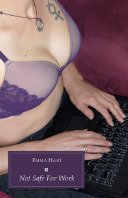In a haze of weary convalescence, it nearly escaped my attention that this is one of my favourite Weeks: Banned Books Week. It’s a celebration of stupidity and small-mindedness and a great excuse to laugh at book burners.
When the children were smaller, I used to make a point of reading to them from something on the U.S. Most Frequently Challenged list. It wasn’t difficult, just a matter of skimming the list until I hit something that was already on our shelves: Sendak’s In the Night Kitchen perhaps. I assume it’s there because of the penis.
As they got older, this was no longer necessary. I could guarantee that, left to their own devices, they’d be reading from that list anyway. Both kids loved Captain Underpants and Harry Potter. Now they’re in their early teens, and if there was a book you found profoundly influential at that age, it’s probably on that list.
Which is about where it might start to get a bit more tricky. The reason To Kill a Mockingbird is there is because it’s been challenged, often successfully, because of its racism. This is the same problem Huckleberry Finn and Tintin in the Congo have: the pressure to ban is not coming from religious conservatives, but from people who find the books’ dated racial attitudes offensive. As adults, we can allow for the attitudes of the time when we read, but can children? We understand that there are limits for what goes into a school library, right, even liberals? It’s not a free for all, but a discussion about where the limits are.
And I’m sure some of the many people who objected to And Tango Makes Three, a book about two male penguins hatching and raising a baby penguin, genuinely did it because they felt the book was ‘anti-ethnic’ rather than for any seemingly more obvious reason.
Sometimes it’s all a bit more <a href="http://www.huffingtonpost.com/joan-e-bertin/banned-books-week-still-n_b_302248.html
" target="_blank">overt and depressing:
This February in West Bend, Wisconsin, a local couple filed a petition calling for the Library Advisory Board to remove or label several Young Adult titles, including Francesca Lia Block's Baby Be Bop and Stephen Chobsky's The Perks of Being a Wallflower, because they felt that all the books in the young-adult section that dealt with homosexuality were "gay-affirming." The couple also requested that the library build a collection of books by "ex-gays" in order to achieve an ideological balance.
As this debate raged on, four members of the library board were not reappointed because of accusations that they were "promoting the indoctrination of the gay agenda." Then the Christian Civil Liberties Union Milwaukee branch filed a lawsuit against the city of West Bend, complaining that the mere presence of some of the young adult books in the library caused "mental and emotional harm" to the elderly plaintiffs. The CCLU seeks $30,000 in damages per plaintiff, the mayor's resignation, and the removal of the books for a public burning
But that’s America, and we all know Americans are crazy, right? Things are better here, we can point and laugh in perfect security. My daughter is head librarian at a school with a large number of conservative Christian families, and nobody has tried to get any Harry Potter or Philip Pullman removed. Christian organisations here don’t seem to push book challenging like they do in the States.
We still ban books though. Here’s a list (warning: Excel spreadsheet) from the Office of Film and Literature Classification of books that have been either banned or restricted since 1965. Have fun with it. Right at the top, you’ll find one of my all-time favourite New Zealand censorship decisions: the restriction of Justine to “psychologists or psychiatrists or any adult bone fide student of literature or philosophy”. Fitting that qualification obviously made me immune to whatever damage would otherwise have been done to me by reading both that and The Story of O, which received the same classification two years later.
If, however, anyone knows anything about Why Was He Born So Beautiful and Other Rugby Songs, banned in 1968, I’ve love to hear it. Also, in 1992, The Limericks of Aleister Crowley was ‘restricted to Tony Hutchins’. Tony? WTF is with that?
Later restrictions seem to break down into three neat categories: scary scary guns (Expedient Homemade Firearms: the 9mm Submachine Gun), drugs (The Construction and Operation of Clandestine Drug Laboratories) and ‘deviant’ sex (at least, I’m kind of hoping that’s what A Librarian Enslaved is).
And once a book is banned, that’s it, right? There’s no way to get hold of it after that. It’s not like anyone’s compiling pages of links to ebooks of banned and challenged texts. Imagine the lengths you’d have to go to to get hold of
